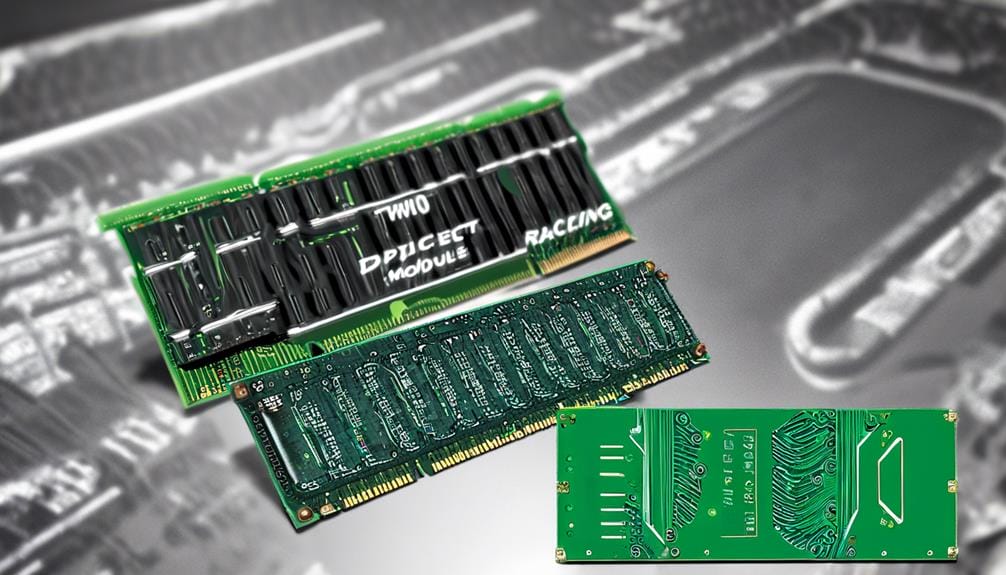Navigating the digital jungle of RAM speeds can feel like a daunting task, but with the right guide, it's a journey you can confidently embark on. You're likely wondering whether there's a significant difference between 3200MHz and 3600MHz RAM speeds. On the surface, it may seem like a simple question, but the answer is layered with various aspects such as performance, cost, and compatibility. So, let's pull back the curtain on this technological performance and examine the main actors on the stage – the 3200MHz and the 3600MHz RAM.
Key Takeaways
- RAM speed is measured in megahertz (MHz) and indicates the number of cycles per second.
- Higher RAM speeds, like 3600MHz, provide superior performance for tasks requiring rapid data processing.
- CAS latency measures delay in data availability, and faster RAM usually has lower CAS latency.
- 3600MHz RAM operates at 3.6 billion cycles per second, significantly enhancing data access and processing capabilities.
Understanding RAM Speeds

When you're diving into the details of RAM speeds, it's crucial to understand that the speed, measured in megahertz (MHz), denotes the number of cycles per second your RAM can perform. This speed indicates how swiftly data can be read or written. Higher RAM speeds, like 3600MHz, provide superior performance, significantly benefiting tasks requiring rapid data processing such as gaming or video editing.
However, understanding RAM speeds isn't solely about the MHz value. Consider the CAS latency, which measures delay in data availability. Generally, faster RAM like 3600MHz exhibits lower CAS latency, meaning less waiting around for your data.
Comparing 3200MHz vs 3600MHz, you'll find that 3200MHz RAM is more affordable. It's a cost-effective choice for general computing tasks, delivering ample speed for everyday use. That said, if your work or hobbies demand greater horsepower, 3600MHz might be worth the extra investment.
Performance of 3200MHz RAM
Operating at an impressive 3.2 billion cycles per second, 3200MHz RAM offers you efficient performance for a range of tasks, making it a cost-effective and reliable option. The performance of 3200MHz RAM is enhanced by a lower CAS latency which allows for quicker response times and smooth multitasking capabilities.
Here are three key points that highlight the benefits of 3200MHz RAM:
- Cost-Effectiveness: Compared to higher speed RAM such as 3600MHz, 3200MHz RAM has a lower price point, providing a cost-effective solution for your computing needs.
- Versatility: 3200MHz RAM is suitable for everyday computing, light gaming, and general productivity tasks. Its versatility makes it a practical choice for most users.
- Stable Performance: With a clock speed of 3.2 billion cycles per second, 3200MHz RAM ensures stable and responsive performance across a range of applications.
Ultimately, while 3200MHz RAM may not offer the absolute fastest speed available on the market, its performance is more than sufficient for most users. It provides a balance of cost, versatility, and stable performance, making it a reliable choice for your computing needs.
Performance of 3600MHz RAM

Boasting a tremendous speed of 3.6 billion cycles per second, 3600MHz RAM significantly enhances your system's data access and processing capabilities. This high clock speed translates to superior responsiveness, making the performance of 3600MHz RAM ideal for resource-intensive tasks such as gaming, video editing, and multitasking.
The increased speed also results in lower CAS latency, which translates to faster data processing time. It's a key factor affecting the performance of 3600MHz RAM, as it directly impacts how quickly your system can access data stored in memory. This reduced latency means your system responds more swiftly to your instructions, enhancing overall performance.
That being said, this superior performance comes at a price. 3600MHz RAM tends to be more expensive than its 3200MHz counterpart. However, the investment is worthwhile if you're handling demanding tasks.
Cost Analysis: 3200MHz Vs 3600MHz
While the superior performance of 3600MHz RAM is clear, it's crucial to consider the cost implications when comparing it to the more affordable 3200MHz RAM. The cost analysis: 3200MHz vs 3600MHz reveals some intriguing facts.
- The price of 3600MHz RAM is higher due to its enhanced speed and performance. It's a solid investment for heavy-duty tasks such as gaming or video editing, where the performance difference can be noticeable.
- On the other hand, 3200MHz RAM is a more cost-effective option. Despite lower performance, it's sufficient for basic computing needs and less resource-dependent tasks.
- Remember, the CAS latency of 3200MHz RAM is lower, which means it can perform tasks faster. However, this doesn't always translate to a noticeable speed difference during everyday use.
Compatibility Considerations

When considering RAM speeds, you need to understand the pivotal role of compatibility. Always check your motherboard's specifications and the maximum RAM speed it supports to avoid performance issues. Don't overlook the influence of your CPU's compatibility with higher RAM speeds and the potential for BIOS updates to improve this compatibility.
Understanding RAM Compatibility
Navigating the labyrinth of RAM compatibility requires a keen understanding of several key factors, including your motherboard's specifications, CPU's capabilities, XMP support, voltage requirements, and the potential for future upgrades. Your task involves:
- Verifying your motherboard's compatibility with the faster RAM speed.
- Confirming your CPU's capacity to handle the increased RAM use.
- Ensuring your motherboard supports XMP for easy RAM speed optimization.
It's crucial to check the RAM's voltage requirements against your motherboard's specifications. Also, consider future hardware changes. Opt for RAM that leaves room for future upgrades. Understanding RAM compatibility isn't just about getting the fastest RAM, but ensuring it works harmoniously with your system configuration. Thorough consideration of these points will lead to a smooth, efficient computer operation.
Motherboard and RAM Speeds
In assessing your motherboard's compatibility with higher RAM speeds, it's paramount to scrutinize its specifications, especially if you're targeting speeds of 3600MHz or beyond. Not all motherboards can handle such clock speeds, and some might need BIOS updates. Overclocking is another aspect to consider: certain motherboards support this feature, allowing you to push your RAM speed to 3600MHz. But be cautious, this hinges on your model's specific capabilities. Furthermore, higher RAM speeds require superior power delivery and cooling, which your motherboard's VRM and thermal solutions must accommodate. Lastly, check your CPU's supported memory speeds. You need to ensure the RAM speed you've chosen aligns with your CPU's capabilities, ensuring a harmonious computing environment.
Impact on System Performance
Having established the relationship between your motherboard and RAM speeds, let's now examine how these high-speed RAM choices can influence your system's overall performance considering compatibility.
- Motherboard Compatibility: Ensure your motherboard supports the desired RAM speed and has necessary BIOS updates. This can make a difference in harnessing the full performance potential of 3200MHz or 3600MHz RAM.
- CPU Compatibility: Your CPU may also have limitations on supported RAM speeds. It's crucial to check this compatibility to optimize performance.
- System Stability: Faster RAM speeds may require fine-tuning and stability testing. Overclocking considerations, such as additional cooling and power, can make a difference in your system's stability.
Gaming Performance: 3200MHz Vs 3600MHz

When you're deep into an intense gaming session, the difference between 3200MHz and 3600MHz RAM speeds could make a noticeable impact on your performance. While both of these speeds are considered high and capable of handling most games, the quicker response time of the 3600MHz may give you a slight edge, particularly in games that demand high computational power and quick memory accesses.
For instance, in fast-paced, competitive games where every millisecond counts, the 3600MHz RAM's faster data transfer could mean the difference between victory and defeat. The increased speed allows your system to read and write data more quickly, thereby reducing lag and ensuring smoother gameplay.
However, it's important to note that the performance boost isn't massive. You might find that the improvement in frame rates is only marginal and might not justify the price difference for some. Yet, the next time you're looking to upgrade, if you're a serious gamer seeking every possible advantage, the 3600MHz RAM might be worth considering.
Final Verdict: 3200MHz or 3600MHz?
So, is it worth investing in 3600MHz RAM or is 3200MHz more than enough for your needs? Let's weigh up the performance differences, consider the cost-benefit, and think about compatibility. Remember, your decision should hinge on your specific computing needs and budget.
Performance Differences
In deciding between the 3200MHz and 3600MHz RAM, it's crucial to consider the specific performance needs of your computer tasks.
- The 3600MHz RAM operates at a higher speed, enabling more data transfers per second which is ideal for gaming and heavy tasks.
- The 3200MHz RAM, although slower, is more affordable and well-matched for less resource-dependent tasks due to its lower CAS latency.
- Despite the same capacity, the 3600MHz RAM outperforms the 3200MHz RAM when running multiple programs simultaneously.
Cost-Benefit Analysis
Taking into account the performance differences between 3200MHz and 3600MHz RAM, let's now weigh the cost against the benefits, helping you decide which of these two options best suits your needs and budget. The 3600MHz RAM provides higher performance, ideal for demanding tasks like gaming or video editing. However, it comes with a heftier price tag. On the other hand, the 3200MHz RAM, while slightly slower, is more cost-effective and suitable for tasks with moderate requirements. It's crucial to consider the specific needs of your tasks and the trade-off between performance and cost when choosing. So, if budget is your concern, the 3200MHz RAM is a more economical option, while the 3600MHz RAM is for those seeking higher performance.
Compatibility Considerations
Before diving into the final verdict between 3200MHz and 3600MHz RAM, it's crucial to weigh in on compatibility considerations, ensuring your system's motherboard and CPU support your chosen RAM speed.
- First, verify your motherboard's supported RAM speeds. Compatibility is key; if your motherboard doesn't support 3600MHz, then everything else is moot.
- Next, check your CPU's specifications. Some CPUs may not support higher RAM speeds, making 3200MHz a better choice.
- Lastly, ensure your system's BIOS supports the RAM speed you've chosen. This is essential for stable performance.
Conclusion
In the end, it's a classic case of the tortoise vs. the hare. If you're a hardcore gamer or video editor, the swift, powerful 3600MHz RAM may be your champion. But don't underestimate the 3200MHz tortoise – it's reliable, cost-efficient, and more than capable for everyday tasks. Remember, it's not always about the fastest, but what serves your needs best. Weigh your options, consider your budget, and choose wisely. After all, slow and steady can also win the race.


